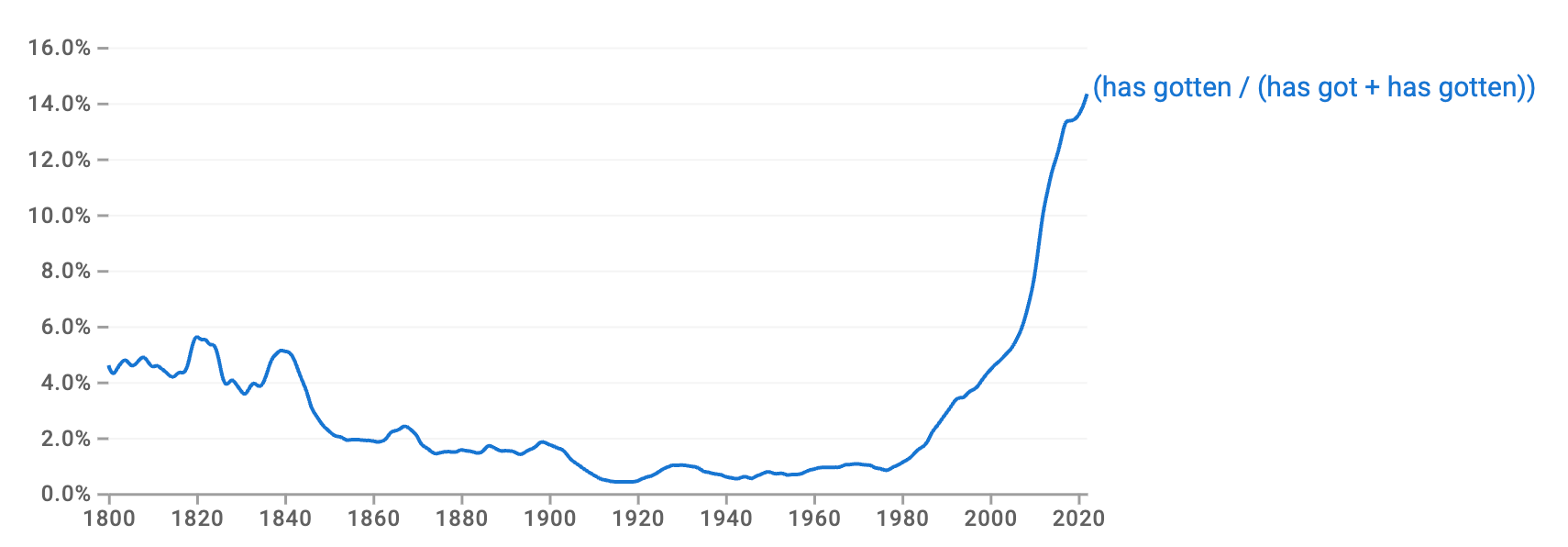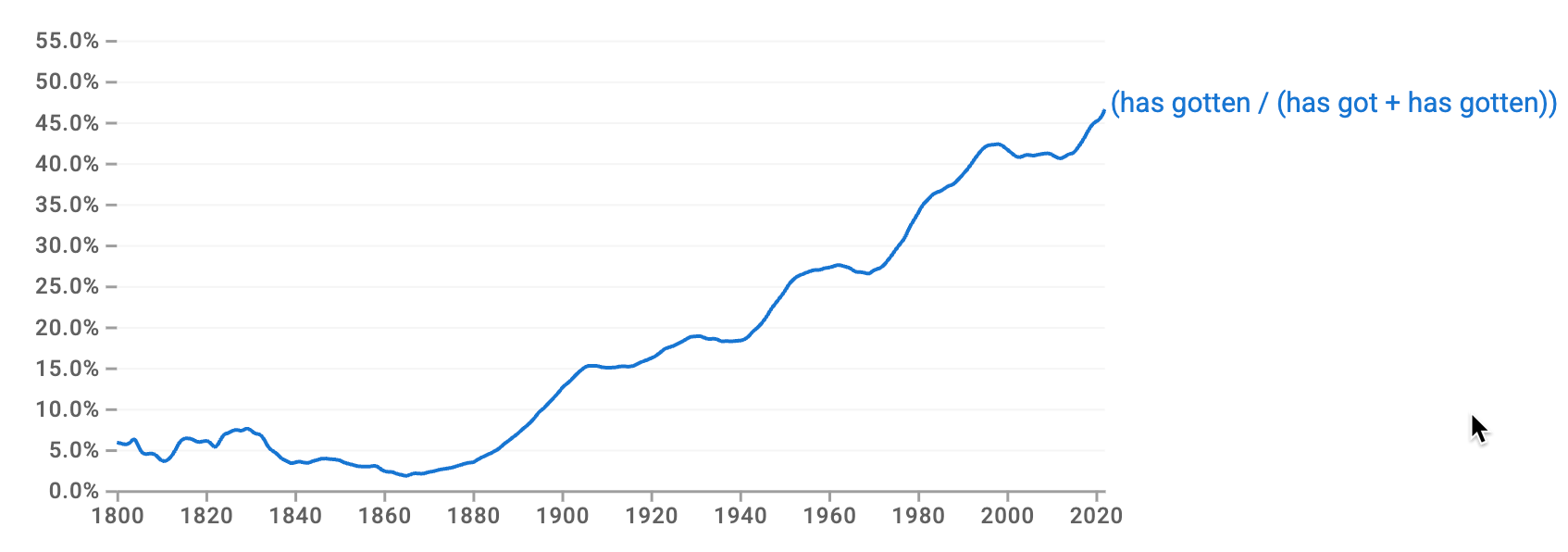"A tricky little area of semantics"
« previous post | next post »
Elizabeth Ribbens, "How the use of a word in the Guardian has gotten some readers upset", The Guardian 6/4/2025:
‘Got’ was changed during the editing of an opinion piece, leading to correspondence lamenting a slide into American English. But language isn’t a fortress.
In Shakespeare’s Henry VI, Part II, a messenger breathlessly announces to the king that, “Jack Cade hath gotten London bridge”. Hold this late 16th-century text in mind as we fast forward to last week when Martin Kettle, associate editor and columnist at the Guardian in the UK, was seen to suggest in an opinion piece that, if King Charles has pushed the boundaries of neutrality, such as with his speech to open the new Canadian parliament, he has so far “gotten away with it”.
In a letter published the next day, a reader asked teasingly if this use of “gotten” – and another writer’s reference to a “faucet” – were signs the Guardian had fallen into line with Donald Trump’s demand that news agencies adopt current US terminology, such as referring to the “Gulf of America”.
Another, who wrote to me separately, had first seen the article in the print edition and expected subeditors (or copy editors, if you wish) would eventually catch up and remove “gotten”, which “is not a word in British English”. She was surprised to find the online version not only unchanged but with the phrase repeated in the headline.
FWIW, the cited opinion piece has now been edited to use got rather than gotten:
Geoff Pullum's comment:
David Crystal is quoted on the point that Am uses both forms, but he doesn't explain the contrast between them, because that would involve him in a tricky little area of semantics relating to the difference between actions (He has gotten away with it) and states (He has got a lot of nerve).
Or a minimal pair like
- Kim has gotten Parkinsonism.
- Kim has got Parkinsonism.
Of course the socio-morpho-semantics of got(ten) is more complicated than that — most of the issues are covered in the got, gotten entry in Merriam-Webster 's Concise Dictionary of English Usage. I'll leave it to the commenters to excavate further.
But in terms of socio-geographical evolution, Google Books Ngrams suggests that the British anti-gotten faction are losing — here's the plot for "British English", showing that has gotten started rising around 1980 and has now topped 14%:
The plot for "American English" shows has gotten has been rising since 1865 or ao, and is now above 46%:
Again, there are aspectual and other semantic choices as well as morphological preferences, but it's clearly true that there's a geographical issue, and a secular change in favor of the American (and Shakespearean) choice. (Although Google Books' geographical assignment of publications is far from perfect…)



Philip Taylor said,
June 5, 2025 @ 8:04 am
« […] “gotten”, which “is not a word in British English” » — Hmm. So "ill-gotten gains" is not a well-attested idiom in British English ? I am very much surprised,
Mark Liberman said,
June 5, 2025 @ 8:10 am
@Philip Taylor: "Ill-gotten" became an idiom before gotten began to fade from British usage — the OED dates it to the mid-16th-century:
a1555. Yll gotten goodes. H. Latimer, 27 Sermons (1562)
J.W. Brewer said,
June 5, 2025 @ 11:26 am
The MWDEU entry contrasts British hostility to "gotten" its acceptance (in certain constructions) in "North American English," from which I conclude that this is an issue on which CanEng is aligned with AmEng. Surely using a Canadianism in the headline of a story about something the King of Canada has done is not a capitulation to creeping Americanism?
Chester Draws said,
June 5, 2025 @ 2:42 pm
I've always found the refusal to accept "gotten" rather annoying from people who use "forgotten" with no issues at all. It's a peeve when you insist on something that is irregular over something that is regular, in my opinion, and then try to defend it as logical.
I write formally in British idiom, but sometimes — like the Guardian headline — gotten is just plain better.
Kenny Easwarann said,
June 5, 2025 @ 3:41 pm
I remember many years ago talking to the son of my host family in Hungary, noting that it was odd that Hungarian doesn't have a verb "to have" (instead they say things like "for me there is a my-book" instead of "I have a book") and he was a bit confused about what the verb might even mean – I then realized that he had learned British English, and always used "have got" instead of "have".
David Marjanović said,
June 5, 2025 @ 6:42 pm
Britain is not homogenous in such matters, and I have it on good authority that there are places where gotten is normal – admittedly, my first-hand source was born after 1980.
Outside of so-called Standard Average European, such constructions are quite common. Russian has lost its verb for "have" (outside of academic registers, unless that's actually a loan from Church Slavic) and uses "at me there-is book". Classical Latin didn't have one either (habere meant "hold") and used "for-me book is".
Mandarin has a "have", though.
ktschwarz said,
June 5, 2025 @ 8:24 pm
"Gotten" went out of favor in standard written English sometime between Shakespeare's day and the 1700s. Lowth's grammar of 1762 still remembered the old ways and fulminated against "had got" (among others such as "had wrote", "had chose") as “a very great Corruption, by which the Form of the Past Time is confounded with that of the Participle”.
It was revived in the US starting in the late 19th century; Lynne Murphy has a section on it in The Prodigal Tongue, suggesting "that's when America's linguistic center of gravity really started to shift away from Britain" because of westward migration and immigration from countries that weren't England.
But after that book was published, Murphy noticed that "gotten" was staging a comeback in British English as well, naming it her 2019 US-to-UK Word of the Year. See that blog for more discussion, concluding with "the fact that younger people are un-self-consciously saying it makes me think that it will get bigger still."
J.W. Brewer said,
June 5, 2025 @ 9:57 pm
Shakespeare/Shmakespeare, let's see what the LORD our God (as mediated to us by the Holy Ghost's oversight of the translators of the King James Version) thinketh about the issue. There are per the search engine I'm consulting 54 instance of "gotten" in the KJV (including the so-called "Apocryphal" books), all the way from Genesis 4:1 to Revelation 15:2. Although only two of the 54 hits are in the New Testament, which is a bit peculiar, especially given how many are in the Apocrypha, meaning it's not just some artifact of Englishing Greek rather than Hebrew.
There are two KJV instances of "had got," FWIW (Gen. 36:6 & 1 Mac. 11:49), so maybe the transition was just beginning.
This does make me wonder how British prescriptivists decide whether to react to "have gotten" as "vulgar modern Americanism" versus "poetic-sounding archaism, but to be avoided unless you're doing historical fiction."
TR said,
June 5, 2025 @ 11:10 pm
@DM, Latin has both constructions; habere very often straightforwardly means "have".
Keith said,
June 6, 2025 @ 1:15 am
The Grauniad is written by a wide variety of peeps, and I regularly find myself puzzling over a particular bit of vocabulary or of construction until I understand that it was written in Australian, Canadian or US English; once my mind is tuned to that, reading becomes almost effortless.
A contrived example would be a headline such as "Victorian rail travel still slow"… Oh, really? And then when I notice that the article is about contemporary rail travel in the Australian state of Victoria, the headline becomes clear.
Peter Cyrus said,
June 6, 2025 @ 3:27 am
There's a lengthy discussion of *gotten* in the comments on a Geoff Lindsey video on YouTube: https://www.youtube.com/watch?v=pCmTKLhHyPc&lc=UgzMZBUPOhV1SPxJ19h4AaABAg.9xNQSs3PashAIWNFRj0bsz
PMB said,
June 6, 2025 @ 6:12 am
That low level of "got" in UK English seems to reflect the growth of cheap and later free (from 1870) primary education, and the standards by which the performance of teachers was assessed. One of the criteria was the suppression of local dialects in schools (and Welsh and Gaelic where they were spoken). Leading to the classic response to a correction by a Lancashire teacher – Teacher: 'Why is this sentence wrong, Billy?" Pupil: "Why Miss, Ah've putten 'putten' wheer Ah should have putten 'put'."
Julian said,
June 6, 2025 @ 9:44 am
In my Australian primary school in the 1960s we had a spelling/ grammar book that tried to picture – literally – various rules in a way that was supposed to amuse a ten year old. "Bossy E" as a little stick figure with a head like an E grabbing onto the end of a word etc
"Got" as in "I've got two yoyos" and "Have you got a minute?" was greatly deprecated. "Got" was an ugly hairy creature muscling in where it wasn't wanted. Well brought up children were supposed to say "I have two yoyos."
I suspect that "I've got …" Is an example of the phenomenon that when language change makes a word too short we may make it a bit longer again in some way for the sake of clarity.
For example Latin "hodie" (today) > Italian "oggi", French "hui" (I assume; not sure about that stage ) > "aujourd'hui"
Philip Taylor said,
June 6, 2025 @ 1:50 pm
At my primary school (I forget which, I attended several) we were taught "Treat 'lot' and 'got' as if they were red hot". I still avoid "got" to this day, although I have no aversion to "lot".
ajay said,
June 10, 2025 @ 8:15 am
I wonder how many of the "gotten" mentions in British English are in specific cliche phrases like "ill-gotten gains" (which predates the loss of "gotten") and "gotten away with it" (which is, I would imagine, largely due to Scooby-Doo)? I certainly see both in BrE, but I don't think it's common to see "he had gotten off the bus" or "she has gotten herself a new car".
Chas Belov said,
June 19, 2025 @ 8:14 pm
American English speaker here. Both of those sentences strike me as odd.
For "he had gotten off the bus," I'd say "He's gotten off the bus."
For "she has gotten herself a new car," I'd say "She's gotten herself a new car."
I know the last one is technically equivalent, differing only in the contraction, but spelling it out makes it sound stilted to me.